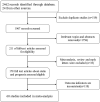Impact of statin use on cancer-specific mortality and recurrence: A meta-analysis of 60 observational studies
- PMID: 32243380
- PMCID: PMC7220704
- DOI: 10.1097/MD.0000000000019596
Impact of statin use on cancer-specific mortality and recurrence: A meta-analysis of 60 observational studies
Abstract
This meta-analysis mainly summarized the studies reporting an association between statin use and cancer-specific mortality and recurrence or progression of cancer patients.We systematically searched for studies about the statin used in cancer patients in electronic databases, including PubMed, Web of Science, Cochrane, Clinical Trials, from inception through the November 2019. A total of 60 studies which included 953,177 participants were eligible with 233,322 cancer patients used statin. Our analysis selected studies presented with outcome based on hazard ratios (HRs) and 95% confidence intervals (CIs) of cancer-specific mortality and cancer recurrence-free survival or progression-free survival. Heterogeneity between the studies was examined using I statistics, and sensitivity analyses were conducted to assess the robustness of the findings. All statistical analyses were performed using RevMan software (version 5.3).The use of statin was potentially associated with a decline in cancer-specific mortality in cancer patients (HR = 0.78; 95% CI: 0.74, 0.84; n = 39; I = 85%). Furthermore, statin use was associated with improved recurrence-free survival (HR = 0.87; 95% CI: 0.78,0.97; n = 23; I = 64%), but not with improvement in progression-free survival (HR = 1.05; 95% CI: 0.95,1.16; n = 14; I2 = 38%).The meta-analysis demonstrated that statin use could exhibit potential survival benefit in the prognosis of cancer patients. But our results are conservative for statins to improve disease recurrence and progression. These findings should be assessed in a prospective randomized cohort.
Conflict of interest statement
The authors have no conflicts of interest to disclose.
Figures





Similar articles
-
Statin use and prognosis of lung cancer: a systematic review and meta-analysis of observational studies and randomized controlled trials.Drug Des Devel Ther. 2019 Jan 23;13:405-422. doi: 10.2147/DDDT.S187690. eCollection 2019. Drug Des Devel Ther. 2019. PMID: 30774306 Free PMC article.
-
Statin therapy in the treatment of active cancer: A systematic review and meta-analysis of randomized controlled trials.PLoS One. 2018 Dec 20;13(12):e0209486. doi: 10.1371/journal.pone.0209486. eCollection 2018. PLoS One. 2018. PMID: 30571754 Free PMC article.
-
Effects of statin exposure and lung cancer survival: A meta-analysis of observational studies.Pharmacol Res. 2019 Mar;141:357-365. doi: 10.1016/j.phrs.2019.01.016. Epub 2019 Jan 11. Pharmacol Res. 2019. PMID: 30641276
-
Impact of postdiagnostic statin use on ovarian cancer mortality: A systematic review and meta-analysis of observational studies.Br J Clin Pharmacol. 2018 Jun;84(6):1109-1120. doi: 10.1111/bcp.13559. Epub 2018 Apr 2. Br J Clin Pharmacol. 2018. PMID: 29453799 Free PMC article.
-
The association between statin use and prognosis in esophageal cancer patients: A meta-analysis.Medicine (Baltimore). 2023 Mar 24;102(12):e33359. doi: 10.1097/MD.0000000000033359. Medicine (Baltimore). 2023. PMID: 36961185 Free PMC article.
Cited by
-
Messing Up the Cancer Stem Cell Chemoresistance Mechanisms Supported by Tumor Microenvironment.Front Oncol. 2021 Jul 20;11:702642. doi: 10.3389/fonc.2021.702642. eCollection 2021. Front Oncol. 2021. PMID: 34354950 Free PMC article. Review.
-
Visceral Obesity and Its Shared Role in Cancer and Cardiovascular Disease: A Scoping Review of the Pathophysiology and Pharmacological Treatments.Int J Mol Sci. 2020 Nov 27;21(23):9042. doi: 10.3390/ijms21239042. Int J Mol Sci. 2020. PMID: 33261185 Free PMC article.
-
The Association of Metformin, Other Antidiabetic Medications and Statins on the Prognosis of Rectal Cancer in Patients with Type 2 Diabetes: A Retrospective Cohort Study.Biomolecules. 2022 Sep 15;12(9):1301. doi: 10.3390/biom12091301. Biomolecules. 2022. PMID: 36139140 Free PMC article.
-
Cholesterol in the ciliary membrane as a therapeutic target against cancer.Front Mol Biosci. 2023 Mar 16;10:1160415. doi: 10.3389/fmolb.2023.1160415. eCollection 2023. Front Mol Biosci. 2023. PMID: 37006607 Free PMC article. Review.
-
Statin Use Ameliorates Survival in Oral Squamous Cell Carcinoma-Data from a Population-Based Cohort Study Applying Propensity Score Matching.Biomedicines. 2023 Jan 27;11(2):369. doi: 10.3390/biomedicines11020369. Biomedicines. 2023. PMID: 36830906 Free PMC article.
References
-
- Matusewicz L, Meissner J, Toporkiewicz M, et al. The effect of statins on cancer cells--review. Tumour Biol 2015;36:4889–904. - PubMed
-
- Lipinski MJ, Abbate A, Fuster V, et al. Drug insight: statins for nonischemic heart failure--evidence and potential mechanisms. Nat Clin Pract Cardiovasc 2007;4:196–205. - PubMed
-
- Hoque A, Chen H, Xu XC. Statin induces apoptosis and cell growth arrest in prostate cancer cells. Cancer Epidemiol Biomarkers Prev 2008;17:88–94. - PubMed
-
- Liu H, Liang SL, Kumar S, et al. Statins induce apoptosis in ovarian cancer cells through activation of JNK and enhancement of Bim expression. Cancer Chemother Pharmacol 2009;63:997–1005. - PubMed
Publication types
MeSH terms
Substances
LinkOut - more resources
Full Text Sources
Medical

